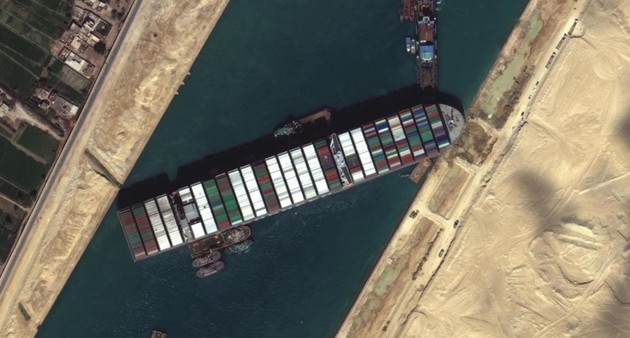The Trans-Caspian International Transport Route came in the spotlight after one of the world’s largest container ships, Ever Given, lodged in the Suez Canal, halting maritime traffic for a week and causing billions of dollars in losses, Caspian News writes. The Suez Canal connects the Mediterranean Sea to the Red Sea and provides the shortest sea link between Asia and Europe, with about 12 percent of total global trade moving through it.
The week-long obstruction had a significant negative impact on trade between Europe and Asia and the Middle East, preventing hundreds of vessels from passing through the waterway. According to the London-based Lloyds List shipping news journal, every hour of the blockage costed the global economy an estimated $400 million, which made about $10 billion a day. Some ships decided not to wait, taking the long way around the Cape of Good Hope in Africa, a trip which can add up to two weeks to journey time and mean more than $26,000 a day in fuel costs.
On March 29, the ship was finally freed by tugs, but the crisis got many people thinking about alternatives to one of the world’s busiest waterways. The Suez Canal blockage has highlighted a potential risk for global supply chains already affected by the year-long economic disruption caused by the coronavirus pandemic and prompted efforts to find an alternative to the vital but vulnerable shipping corridor.
The Trans-Caspian International Transport Route or TITR passing through the Caspian Sea could be the valuable key to connecting Asian and European markets via the South Caucasus and diversifying trade between East and West.
In 2013, officials from Azerbaijan Railways, Kazakhstan Temir Zholy, and Georgian Railway agreed to develop the route passing through the Caspian Sea. Later, Ukraine, Romania, and Poland joined the ambitious project. The first container train from China running on the route arrived at the Baku International Sea Trade Port in August 2015.
As of today, TITR runs from the Chinese Lianyungang seaport to the Chinese-Kazakh border through Kazakhstan, the Caspian Sea, Azerbaijan, and Georgia to Ukraine and Poland. Goods are transported by railway to the Kazakh seaports of Aktau and Kuryk, and further being sent to the Baku International Sea Trade Port (Port of Baku) in Azerbaijan by ships via the Caspian Sea. In Azerbaijan, containers are transported along the Baku-Tbilisi-Kars railway. The route further splits up into two with both leading to Europe — one of them passes through the Turkish cities of Mersin and Istanbul and the Mediterranean Sea, while the other one stretches to the Ukrainian city of Chernomorsk via the Black Sea. In addition, a single tariff and a single-window systems have been established along the entire route, which helps reduce time delays and operational costs.
Efgan Nifti and Jeremy Cohen, contributors to the Caspian Policy Center, are convinced that the Trans-Caspian trade and transit corridor would offer a valuable alternative to Suez Canal for handling East-West trade.
“Sending goods overland through Central Asia, across the Caspian Sea, and then to the Black Sea through the South Caucasus would add a reliable new route for moving goods between Europe and Asia in the tradition of the famed Silk Road,” they wrote in an article titled “Suez Canal Shutdown Highlights the Need for a Trans-Caspian Trade Corridor.”
A vessel that is loaded in Shanghai, Shenzhen, or Qingdao requires a minimum of 30-40 days to reach a port of discharge located in Europe via the Suez Canal. However, it takes up to 20-25 days to transport cargo from China to Ukraine’s Chernomorsk city seaport and further to European markets along the Trans-Caspian International Transport Route.
On February 17, the block train from China — the first in 2021 — arrived in Baku, covering the distance from Qingdao in China to Azerbaijan’s capital city in 15 days. A block train then left Baku via Baku-Tbilisi-Kars railway line.






